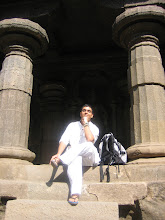Part I
The first thing which confronted me when opening this book was Andy Rotman's thorough introduction. As with all translation jobs, there's often a fine line to be walked between a more literal (and scholarly) presentation and more free flowing and"looser" one. Rotman manages to deal with this in the form of VERY extensive notes and annotations. For the hardcore Sanskrit students and scholars, many of the notes include the original passages from the Sanskrit. Many of the explanatory notes, however, are invaluable for navigating some of the trickier parts of the text.
And now for the stories themselves. The first volume contains the first 17 stories in the collection. While the content of the stories varies, there are a few unifying themes, the most prominent of which is the law of karma:
Meritorious deeds are to be performed.The Divyavadana is filled with many such simple injunctions to do good and avoid unskillful actions. But in the realm of the Divyavadana even something simple can morph into something far beyond imagination. One example, is story no. 8, "The Story of Supriya" (Supriya-avadāna - सुप्रिय अवदान). This tale begins with a group of robbers and bandits that confront the Buddha and his disciples. In the midst of this, the Buddha (himself a master story teller!) tells the story of a fellow named Supriya. Supriya also found himself confronted with bandits who wished to rob him but makes a deal to secure his release. He promises to find the world's ultimate treasures, thereby satisfying everyone's desires. Thus begins an epic quest involving journeys to far off lands, trysts with divine beings, escapes from fearsome monsters, and travels through time and space.
Not performing meritorious deeds brings suffering.
Those who perform meritorious deeds
can rejoice in this world and the next.
At this point I should note that I've always loved a good adventure story. While all the other kids were reading Dr. Seuss, I was delving into kiddie versions of The Odyssey and Jason and the Argonauts. Even now, one of my favorite TV shows is the new Doctor Who series.
But the story of Supriya is not simply an adventure story, it's a Buddhist adventure story, with Dharmic themes running throughout. When celestial Kinnara women try to seduce Supriya, he maintains his cool, deeply impressing them:
"The kinnara girls were pleased and said, "It's amazing! You're so young and yet your passion is the dharma. You aren't attached or bound up with desires!" They presented him with many jewels. Drawn in, as they were, by his discourse on the dharma, they gave him a very special jewel as a reward for his noble words".It wasn't until I finished the Supriya story that I began to realize just why these stories were/are so popular all over the Buddhist world: they work on many, many levels. Profound spiritual teachings are eloquently wrapped in great stories. Some are epic and some are subtle but they all leave a lasting impression on the mind-stream.
One of the shortest but certainly one of the most memorable is story no. 14, "The Story of a Wretched Pig" (Sūkarika-avadāna, सूकरिक अवदान). Here, an inhabitant of a heavenly realm at the end of his life has a vision...of his future rebirth as a pig! As he is about to die, the terrified god struggles to find something that will prevent this unfortunate birth. I won't give away the story but I will say that he resorts to something very simple as a way to try and "escape" his impending destination.
Another tale that left a lasting impression on me is story no. 17, the Story of Māndhātā (Māndhātā-avadāna, मन्धाता अवदान). In this story, the great and powerful king Māndhātā conquers the earth and many heavenly realms with his invincible army. Māndhātā however, doesn't establish control through force or violence, by rather by sheer powerful of his merit. All those who initially oppose him quickly join his ranks, again by the power of Māndhātā 's merit:
Then King Māndhātā arrived at that place and said "Who blocked the army?"Far from being a belligerent tyrant, King Māndhātā actually embodies the idea of the Wheel-Turning King. He also uses his vast, merit-fueled powers to (literally) shower his subjects with the finest of foods, fragrances, jewels, and clothes. Māndhātā's march to the heavens ultimately culminates with his meeting Śhakra, the king of the gods. Śhakra and the gods of the Trāyastriṃśa Heaven give King Māndhātā and his retinue a warm welcome and Śhakra even offers to share half of his seat with Māndhātā. In an single moment however, something happens which instantly leads to Māndhātā's downfall. Most interestingly, his defeat, like his conquests, involves no force. Again, I won't spoil it, but let's say it's the kind of story that powerfully illustrates the opening line of the Dhammapada:
"My lord," they said, "it's the Sadāmatta gods."
"Then the Sadāmatta gods shall become my attendants as well!" the king said. And so the Sadāmatta gods along with the other gods and nāgas began to march in front of him.
All experience is preceded by mind,Reading the Divyavadana was a very wonderful and very different experience from so many of the other Buddhist books I've read. It's quickly earned a high spot on my favorite books list and I'm eagerly awaiting Rotman's translation of the second half. I can easily understand why these stories have been around for so long and why they've been so influential. It is my hope that they will continue to enrich, entertain, teach, and inspire practitioners of the Buddha's Dharma for generations to come.
Led by mind,
Made by mind.
Speak or act with a corrupted mind,
And suffering follows
As the wagon wheel follows the hoof of the ox.
-Dhp Ch. 1. v. 1, trans. by Gil Fronsdal








No comments:
Post a Comment